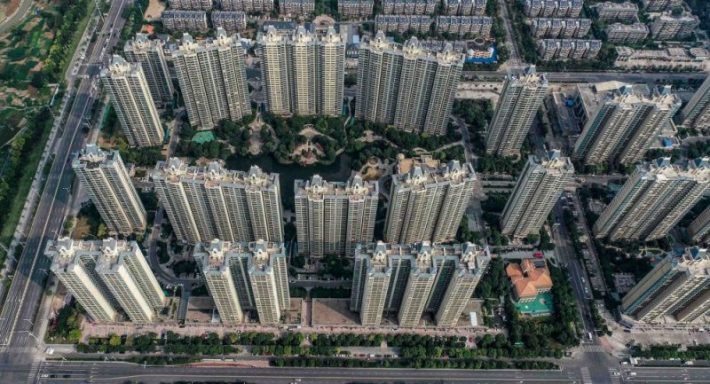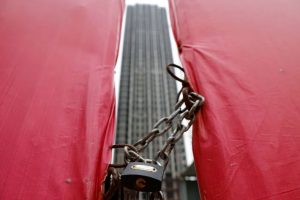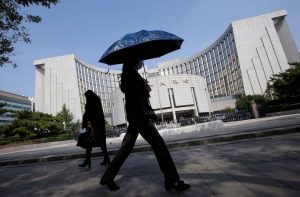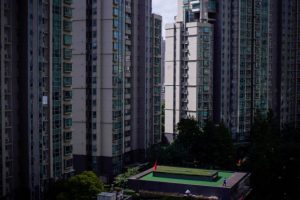The China Evergrande debt crisis has sent shockwaves through the country’s construction, commodities, and property sectors.
This year is likely to witness the collapse of more Chinese property firms as the China Evergrande debt crisis rumbles on. Tight funding access, falling sales and rising debt repayment pressures continue to intensify an unprecedented liquidity crunch for the firms.
Although concerns about China Evergrande eased somewhat in the first weeks of 2022, while the stricken giant goes through a massive state-led restructuring operation, its default on a bond repayment of $255m on December 28 reminded everyone just how frail China’s gigantic property sector is.
An estimate by Nomura analysts shows China’s developers face repayment of $19.8 billion in dollar-denominated offshore bonds in the first quarter of 2022.
That is almost twice the amount they were faced in the fourth quarter of 2021 – a burden that set off a default at not only Evergrande but a long list of firms including Yango, Kaisa Group, Sinic Holdings, Fantasia and Modern Land.
Also on AF: China’s Market Moving ‘National Team:’ All You Need to Know
Large private real estate companies including Guangzhou R&F Properties Co. and China Aoyuan Group are facing similar liquidity crises and teetering on the brink of default too, as Evergrande’s failure has led to a loss of investor confidence.
With almost a quarter of the country’s GDP tied up in the property market, a series of industry defaults could prompt a sudden sell-off, sending shockwaves through the entire economy. That would inflict potentially huge losses on investors and put millions of citizens’ homes in peril.
Analysts at Fitch Ratings expect many firms to rely on internal resources, such as sales receipts and proceeds from asset disposals, to repay debts given their restricted access to the capital market.
Despite the Chinese government easing some measures, new home sales remained weak in December with China’s 50 major developers recording a 25% overall decline in sales volume year-on-year, according to the China Real Estate Information Group (CRIC).
Adding to their financial challenges was an estimated 1.1 trillion yuan ($172 billion) in deferred wages, due to migrant construction workers in January.
Taking a pessimistic assumption that new home sales decline by 30% across the board in 2022, almost one-third of 40 publicly-rated Chinese property developers will face a liquidity crunch this year, according to a report by Fitch Ratings last month.
After Evergrande’s debt crisis intensified last year, Asia Financial identified five companies that were most at risk of default – If Evergrande Falls, Who Will Be Next? Most of our predictions have come true.
Here are five more companies – Zhongliang Holdings Group, Ronshine China Holdings Limited, Shinsun Holdings (Group) Co Ltd, Yuzhou Group Holdings Company Limited and KWG Group Holdings – which are prime candidates for default, taking into consideration their billions of dollars of debt, junk rating downgrades and precarious financial positions.
ALSO SEE: Evergrande Debt Crisis a Risk To China’s Banks, Bonds and Jobs Market
Zhongliang Holdings
Founded by self-made billionaire Yang Jian in 1993 in Wenzhou in the southeastern coast of Zhejiang province, Zhongliang Holdings Group has expanded aggressively on key economic regions with 500 projects across 150 cities in the country. The company ranked as 20th among China’s property developers by total contracted sales in 2021, according to CRIC.
However, Zhongliang’s growth has slowed significantly and its profit margin has diminished over the past few years, according to local media reports. The company has also been frequently confronted by home buyers over defects of its properties.
In November, Fitch Ratings revised the outlook on Zhongliang Holdings Group to negative from positive, citing a possible liquidity crunch.
“We believe Zhongliang may not be able to access the capital market in the near term and expect the company to use cash on hand and internal cash flow to address the upcoming maturities from January to August 2022,” Edwin Fan, an analyst from Fitch, said.
Zhongliang has $1.1 billion in public capital-market debt maturing through to August 2022, $181 million was due in January 2022, $293 million due May 2022, $435 million due July 2022 and $150 million due August 2022, after its recent repurchases of outstanding bonds.
Ronshine China
Founded in 2003 in Shanghai, Ronshine went public in Hong Kong in 2016. It develops mid- to high-end residential properties and commercial properties in cities in the Western Taiwan Straits Economic Zone and first- and second-tier cities. With 250 projects in over 50 cities, Ronshine was ranked 24th by total contracted sales in 2021.
However, Ronshine was unable to recover its profitability quickly enough in the first half of 2021, and its margins are likely to remain thin, according to Fitch Ratings. The agency downgraded Ronshine to B from B+ in November and on February 22 downgraded it again to B-.
“The downgrade reflects increasing uncertainty over refinancing of Ronshine’s capital market maturities” in the second half of this year, it said. Ronshine has sufficient liquidity to address its US dollar bonds due March 2022, “but its capital-market access remains limited, and we believe it may have to rely mostly on cash generation from contracted sales to repay its capital-market maturities in 2022,” said analyst Rebecca Tang.
Fitch say Ronshine has 13.5 billion yuan in capital market maturities due or puttable in 2022, including $394 million in senior notes due 1 March 2022 and $690 million in October 2022. Fitch believes Ronshine has sufficient liquidity to address its US dollar bonds due March 2022, but says its refinancing risk is increasing.
While the company has been purchasing its outstanding bonds to restore its access to the capital market, local media reports said Ronshine had deferred payments totalling 7.4 million yuan ($1.2 million) to construction workers and suppliers for nine months.
MORE: China Evergrande Debt Crisis Triggers Brawl Over Local Assets
Shinsun Holdings
With a focus on the Yangtze River Delta region in eastern China, Shinsun operates over 200 projects in 45 cities. It held its HK$3.3 billion ($423 million) IPO in Hong Kong in November 2020, the largest IPO from a property firm that year.
The company, founded in 1995, was a rising star in China’s property market from 2015 to 2018 as it expanded its revenues by ten times over just a couple of years, but was hit hard by Chinese policymakers’ curbs on developer borrowing.
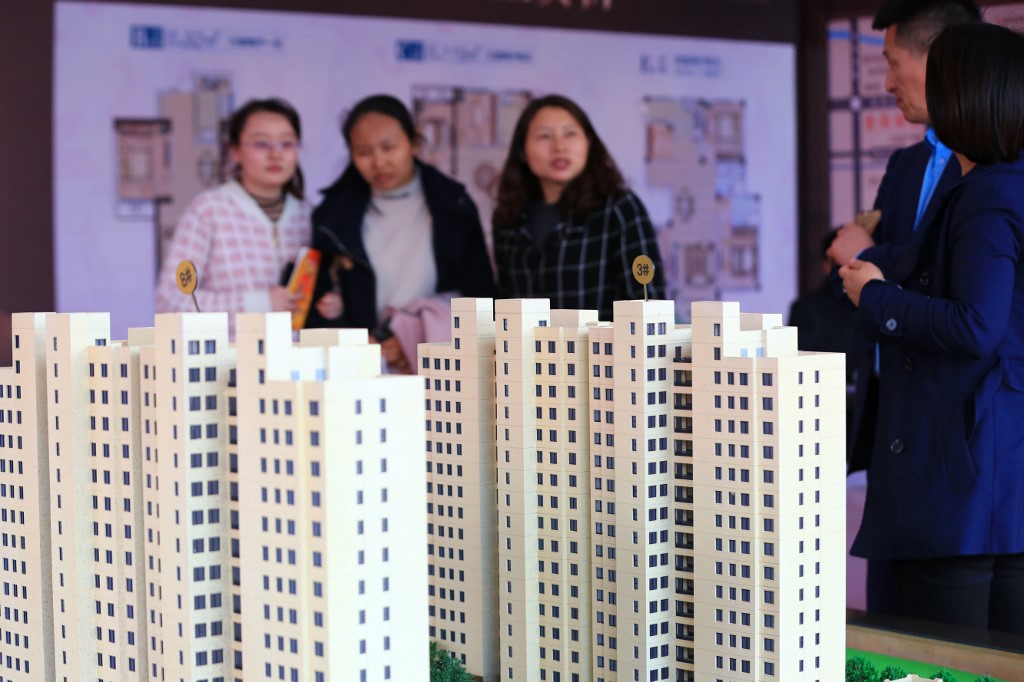
The company said its business was “operating normally” and it had not defaulted on any debt after its Hong Kong-listed shares plunged by 54% on November 18, the one-year anniversary of its IPO.
Local media reports said later that Shinsun had failed to repay employees that contributed to a 1.5 billion yuan ($235 million) private offering fund used for its property development projects.
In December, Moody’s downgraded the corporate family rating of Shinsun to B3 from B2, citing its weakened funding access and sizeable upcoming debt maturities.
Shinsun has approximately $300 million of offshore bonds maturing before the end of January 2022, according to Moody’s analyst Kelly Chen.
Yuzhou Group Holdings Company Limited
Established in 1994 in Xiamen in south China’s Fujian province, Yuzhou has expanded to key economic regions in China and now has about 180 projects in 40 cities. With shares traded in Hong Kong since 2009, it now has two headquarters in Shanghai and Shenzhen.
The company’s home sales grew by only 0.1% in 2021, according to CRIC data, marking a significantly slide compared with a 40% sales growth in Covid-stricken 2020.
Like many other developers facing a liquidity crunch, Yuzhou has put on sale its property service unit for much-needed cash. A statement by the company on January 5 said it agreed to sell its entire ownership in Yuzhou Property for not more than 1.06 billion yuan ($166 million) to CR Mixc Lifestyle, a unit of China Resources Group.
In November, Fitch Ratings downgraded Yuzhou to B from B+ and gave it a negative outlook.
Edwin Fan, an analyst from Fitch Ratings, expects Yuzhou’s sales collection to fall in the next six to 12 months and its cash flow to worsen further if it cannot refinance its debt.
The company appears safe in the short term as it says it has prepared funds to repay the $589 million offshore bonds due in January 2022.
KWG Group Holdings
Founded in 1995 in Guangzhou, the capital city of south China’s Guangdong province, KWG Group has expanded nationwide and now has business in 40 key cities including Beijing, Shanghai and Hong Kong. It had its IPO in Hong Kong in 2007.
In December, KWG Group dismissed rumours that said its executive chairman Kong Jianmin had been summoned by the Guangzhou government for a bribery-related investigation and barred from overseas travel. Kong was previously convicted for bribery and insider trading involving Cao Jianliao, a former government official in Tianhe District in Guangzhou, and Cao’s son, according to a documentary filmed by the local government in 2014.
Last month, Fitch Ratings downgraded KWG Group to B+ from BB- and gave it a negative outlook.
“We expect KWG to use its cash balance and internal cash to repay its concentrated capital-market debt, amounting to more than 16 billion yuan ($2.5 billion) through September 2022,” Tyran Kam, an analyst from Fitch Ratings, said.
KWG said it had 30.5 billion yuan ($4.8 billion) in cash at of the end of September, which is available for debt repayment, but declining sales could point to a worsening of its liquidity.
The company’s contracted sales fell by 29% year-on-year in the third quarter of 2021 and declined by 21% in December.
Deleveraging Policy
Property developers’ difficulties stem partly from their aggressive expansion through leveraging, but also from China’s measures to ramp down risks in its economy.
Wild speculation in real estate had sent property values soaring, spurring a building spree. An estimated 91 million new homes – enough to house all of Germany – still stand empty. In an attempt to slowly deflate such bubbles, authorities imposed new deleveraging rules and borrowing limits on companies.
It established the so-called ‘three red lines’ system in August 2020, which ranked companies according to three levels of indebtedness and liquidity.
Adding to property market pressures, officials limited the amount of land released for development and imposed mortgage quotas on banks. Together these measures forced developers to sell off property quickly and at huge discounts to maintain liquidity, eating into their margins. They also sent prices falling.
Structural problems with China’s economy are also at play. State-owned enterprises (SOEs) enjoy benefits that aren’t available to private firms, creating a clear divergence of performance, according to Natixis Asia Research.
Only 18% of private firms can meet all requirements of Beijing’s ‘three red lines,’ compared with 26% of locally run SOEs and 46% of centrally controlled SOEs, the research firm said.
- By Iris Hong
Read more:
China Courts Freeze Evergrande Assets Over Missed Payments
China Builders And Home Suppliers Warn Of Evergrande Hit
Evergrande Hires More Advisers, Country Garden In Bond Surprise




